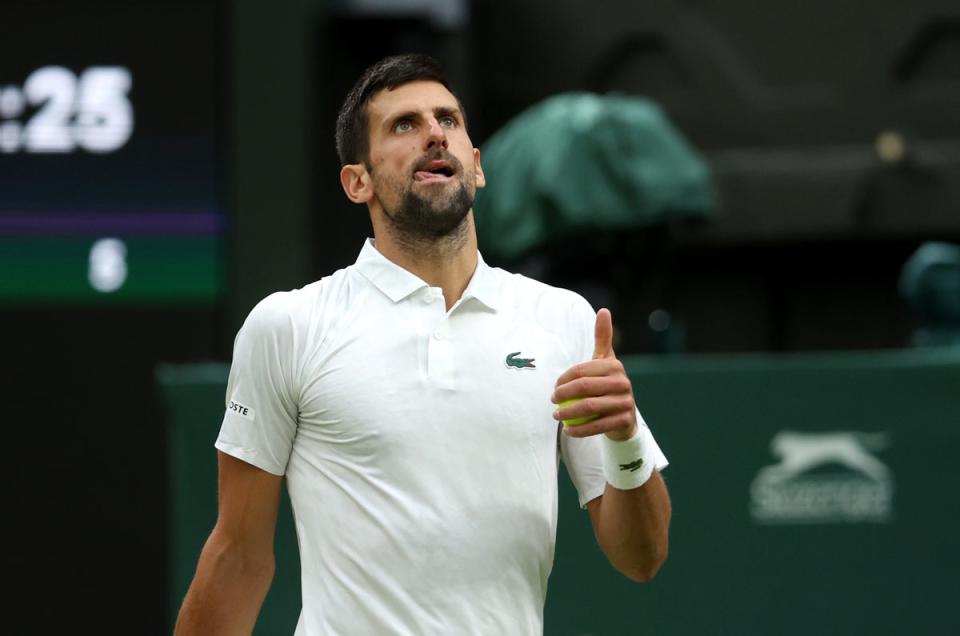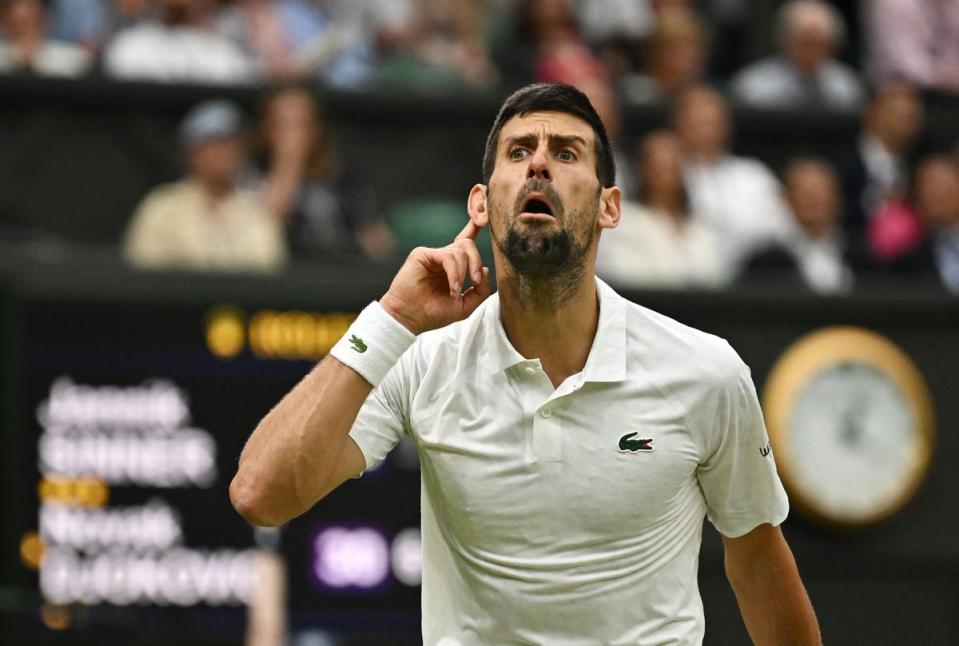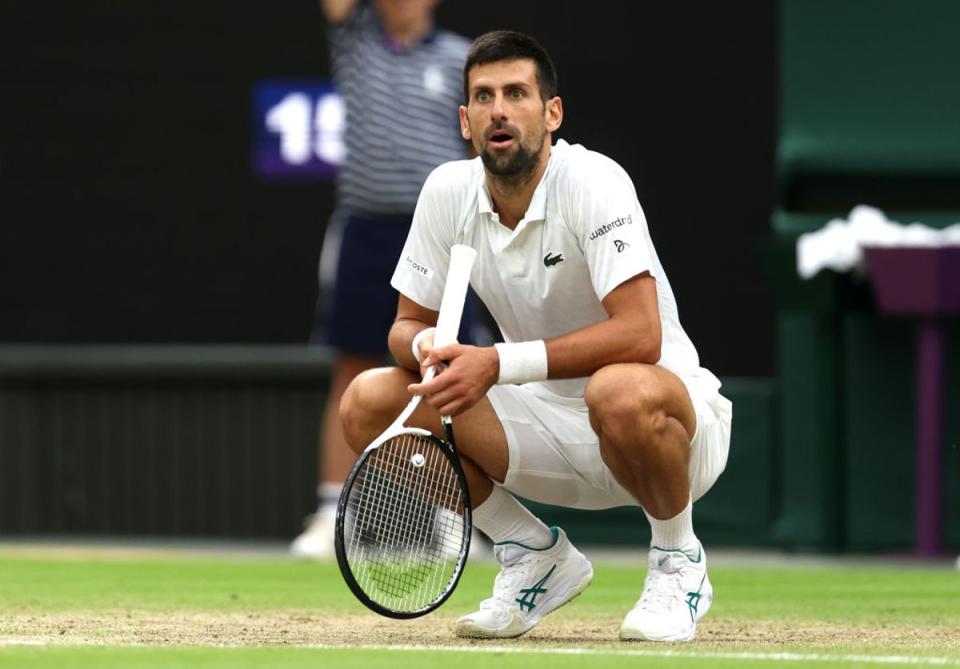Novak Djokovic’s clash with Wimbledon fans and umpire adds tension to the inevitable
Novak Djokovic’s inevitable march to the Wimbledon final was only met by the briefest of interruptions. Unfortunately for Jannik Sinner, it didn’t come from him. Despite the young Italian’s spirit and fine shot-making, Djokovic’s grip on this semi-final was unrelenting, absorbing the power of one of the biggest hitters in the game and closing out a dominant 6-3 6-4 7-6 win that was only complicated by a couple of difficult moments - namely from the chair umpire, Richard Haigh, and some pockets of the Centre Court crowd.
Carlos Alcaraz, through after beating Daniil Medvedev in straight sets, will need to offer more resistance than Sinner managed here, as well as doing a far better job of taking his chances when the two best players in the world meet in Sunday’s final. It’s a dream final, with all the ingredients for a classic. Djokovic, though, is playing better than ever. “36 is the new 26,” he smiled, once the tension had subsided.
And for a while, the tension had been high. The level of Djokovic’s superiority over Sinner, one of the game’s rising stars, was evident by the crowd’s desperation to see a contest. With Djokovic closing in on the final, Sinner stood with two set points at 4-5 in the third and after the Serbian’s first serve landed into the net, there was an excited hiss from high up in the stands. Djokovic paused, then backed away from the baseline, applauding sarcastically and shaking his head. It was a surreal twist: cheering a first-serve is not good form, and it is not what you would expect here. Djokovic, a seven-time champion, had every right to feel disrespected.
But the 36-year-old is also used to it. The higher his level becomes, year after year, the more fans want to see him pushed to his limit. Sinner didn’t manage it, although Djokovic still had to save both set points to force the tiebreak, once again finding a strength from within. Djokovic responded by taunting the front rows, pretending to cry, drawing boos from above. Djokovic’s fans, and he has many here, responded too, and in that moment Centre Court felt split and edgy.

It didn’t last for long: Djokovic closed out the tiebreak, shutting the door on Sinner, and the smile soon returned as he shook hands with the umpire, with whom he had an earlier confrontation. Djokovic was perplexed when called for a hindrance after sending his backhand down the line with a loud shout. A time violation followed in the same game, and Djokovic, for the first time, was faced with jeopardy. “It could have changed the course of the match,” Djokovic admitted. “I felt really nervous after that call.”
But the 23-time grand slam champion managed to keep his head, while remaining at the absurdly high level he has found throughout these Championships. Sinner is a fine player, but he simply encountered an opponent who is as rounded and sharpened as a tennis player can possibly be, hardened by experience and driven by the chance to equal Roger Federer’s men’s record of eight Wimbledon titles on Sunday.

Djokovic was wisened, too, by his match against Sinner here last year, when the Italian won the first two sets of their quarter-final. This time Djokovic was ready and on it from the start. Even though Sinner’s aggressive play and huge hitting created six break point opportunities, including the two set points, Djokovic’s defence and depth of shot were supreme on the pressure moments. He saved them all.
The match proved to be too much of a step up for Sinner, who reached his first grand slam semi-final behind a favourable draw and without having to face an opponent ranked inside the top-50. Sinner was erratic and made far too many errors. At his best, he was able to dictate rallies, his wiry frame leaping onto the returns, stork-like legs positioning himself up the court and long arms swinging fluidly on the forehands, but Sinner struggled to find the consistency over the match his aggressive approach required in order to stand a chance.
Djokovic knows his game well. He regularly practices with the 21-year-old and before the match praised his powerful hitting from the baseline. The crucial difference in the opening set was that Djokovic took his chance and Sinner didn’t: the defending champion finding his spots on serve to close out the opener in 40 minutes.


From there, Djokovic looked set for a smooth passage to his ninth Wimbledon final, until the chair umpire added some drama. As Djokovic sent a backhand down the line, letting out a late grunt as Sinner slid to retrieve the ball, the Englishman Haigh called a hindrance and awarded the Italian the point.
Djokovic was incredulous, squatting behind the baseline in disbelief. As if to further provoke the defending champion, Djokovic was then penalised for the second time and as Sinner pushed for the break, he received a time violation warning on the second deuce.

As it often does, it unlocked another level of defence from Djokovic. Sinner had the break point on his racket after Djokovic returned a series of venomous strikes, before Sinner slumped his forehand into the net. Djokovic again closed it out behind his accurate serve.
Sinner was already faced with a long way back. After being two sets up in the quarter-finals last year, finding himself two sets down hardly bolstered his belief that he could end Djokovic’s run on Centre Court. He was handed a golden opportunity with two set points late in the third, but then Djokovic found the motivation he needed to extend his winning streak at Wimbledon to 34 matches. After Sinner, the umpire, and some over-excited fans tried their best, it will be Alcaraz’s turn to end it before it reaches 35, or an eighth Wimbledon title will follow.

